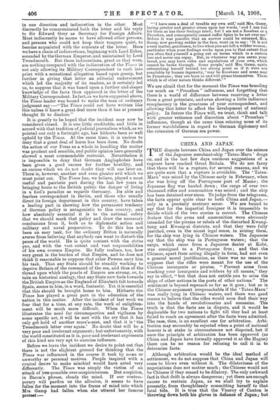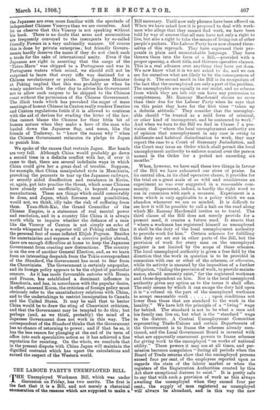CHINA AND JAPAN. T HE dispute between China and Japan over
the seizure of the Japanese merchant-ship Tatsu-Maru ' drags on, and in the last few days ominous suggestions of a rupture have reached Great Britain. We do not fancy that there will be a rupture, for several reasons, and we are quite sure that a rupture is avoidable. The Tatsu- Ilaru' was seized by the Chinese early in February, when she was lying off the Portuguese port of Macao ; the Japanese flag was hauled down ; the cargo of over two thousaud rifles and ammunition was seized ; and the ship has been detained ever since. To judge from the telegrams, the facts appear quite clear to both China and Japan,— only in a precisely contrary sense. We are bound to say that for the impartial foreigner it is impossible to decide which of the two stories is correct. The Chinese declare that the arms and ammunition were obviously intended for the pirates or rebels of the disturbed Kwang- tung and Kwang-si districts, and that they were fully justified, even in the nicest legal:sense, in seizing them, for the ship was lying in Chinese waters. The Japanese say that the ship was in Portuguese waters ; that the cargo, which came from a Japanese dealer at Kobe, was consigned to a Portuguese firm ; and that the Chinese, apart from acting illegally in form, had not even a general moral justification, as there was no reason to suppose that the rifles were meant for the use of the Chinese insurgents or pirates. " Prevent arms from reaching your insurgents and robbers by all means," they say in effect, " but that does not entitle you to seize the ships of other nations in the ports of other nations." The sentiment is beyond reproach so far as it goes ; but so is the Chinese argument irreproachable if the Tatsu-Mara ' was really lying in Chinese waters, and there was good reason to believe that the rifles would soon find their way into the hands of revolutionaries and assassins. The truth is that the facts are in dispute, and it would be deplorable for two nations to fight till they had at least failed to reach an agreement after the facts were admitted. The case, then, is an excellent one for arbitration. Arbi- tration may excusably be rejected when a point of national honour is at stake in circumstances not disputed, but if once the principle of arbitration has been approved (as China and Japan have formally approved it at the Hague) there can be no reason for refusing to call it in to determine facts.
Although arbitration would be the ideal method of settlement, we do not suppose that China and Japan will come to blows even without it. The dilatoriness of the negotiations does not matter much ; the Chinese would not be Chinese if they ceased to be dilatory. The only awkward fact is that drift is always dangerous; yet there are enough causes to restrain Japan, as we shall try to explain presently, from thoughtlessly committing herself to that fatal tide. It is true that the Viceroy of Canton is throwing down both his gloves in defiance of Japan; but the Japanese are even more familiar with the spectacle of independent Chinese Viceroys than we are ourselves. And let us observe that this Viceroy is not speaking without his book. There is no doubt that arms and ammunition are frequently conveyed to the insurgents by so-called friendly Powers in a very unfriendly manner. Of course this is done by private enterprise ; but friendly Govern- ments hardly deserve the name if they do not check such a trade for the sake of international amity. Even if the Japanese are right in asserting that the cargo of the Tatsu-Maru ' was shipped to a Portuguese and was in Portuguese waters when seized, we should still not be surprised to learn that every rifle was destined for a Chinese revolutionary or pirate. The Japanese Minister at Peking implied that this was probably so when he wisely undertook the other day to advise his Government not to allow such cargoes to be shipped to the Chinese coast without the permission of the Chinese Government. The illicit trade which has provoked the anger of mass meetings of honest Chinese in Canton really renders Treaties and Custom regulations futile if it is allowed to continue with the aid of devices for evading the letter of the law. One cannot blame the Chinese °for their little bit of human nature when they make a hero of the man who hauled down the Japanese flag, and mean, like the friends of Trelawny, to " know the reason why " when the Chinese Government reiterates its pledge to Japan to punish him.
We spoke of the causes that restrain Japan. Her hands are very full. Although China would probably go down a second time in a definite conflict with her, if ever it came to that, there are several indefinite ways in which China could give her a great-deal of trouble. Suppose, for example, that China manipulated riots in Manchuria, provoking the peasants to tear up the Japanese railways, or secretly aided disaffection and resistance in Korea, or, again, put into practice the threat, which some Chinese have already uttered unofficially, to boycott Japanese manufactures. These are things which could conceivably be done, and Japan, which foresees most possibilities, would not, we think, idly take the risk of suffering from them. Yuan-Shih-Kai, the Grand Councillor of the Chinese Empire, is a statesman of real mental power and resolution, and in a country like China it is always worth while to inquire whether the defiance of a man like the Viceroy of Canton is not simply an echo of words whispered by a superior will at Peking rather than the personal feat of some inflated Elijah Pogram. Besides the uncertainties and expense of a coercive policy abroad, there are enough difficulties at home to keep the Japanese Government from creating new distractions. The country is on the eve of another General Election, and, as we learn from an interesting despatch from the Tokio correspondent of the Standard, the Government has most to fear from the Chauvinists. The Government is certainly unpopular, and its foreign policy appears to be the object of particular censure. As it has made favourable ententes with Russia and France, has established a dominant influence in Manchuria, and has, in accordance with the popular desire, in effect, annexed Korea, the criticism of foreign policy must obviously refer to the unsatisfactory relations with -China, and to the undertakings to restrict immigration to Canada and the United States. It may be said that to hector China would be to draw the sting of Chauvinist criticism, and that the Government may be tempted to do this ; but perhaps (and, as we think, probably) the mind of a Japanese Government does not work in this way. The correspondent of the Standard thinks that the Government has no chance of returning to power ; and if that be so, it has the less reason for plunging at the end of its term of office into such speculative action as it has achieved a fine reputation for resisting. On the whole, we conclude that in the present dispute with China Japan will maintain the dignified restraint which has upset the calculations and earned the respect of the Western world.











































 Previous page
Previous page